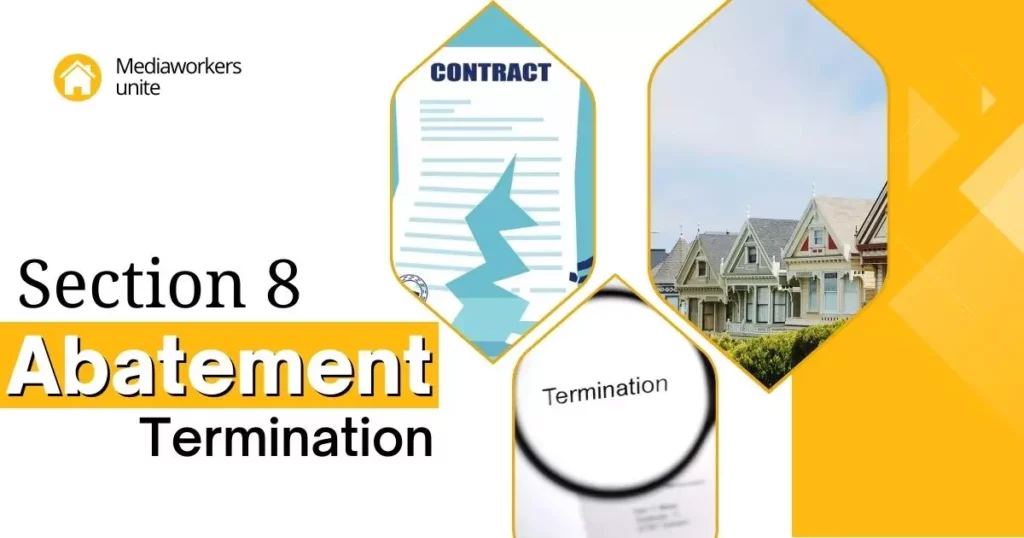Section 8 Abatement Termination: What It Is and How It Works
Section 8 abatement termination is a serious matter and should be taken seriously. Tenants should make sure they understand their rights and responsibilities under the section 8 program and that they are in compliance with all rules and regulations. Tenants should also be aware of their rights to contest the abatement and work to resolve any issues that arise.
- Abatement refers to the process of reducing or ending a tenant’s section 8 housing assistance. It can be temporarily or permanently depending on the severity of the violation.
- Abatement can be implemented by the housing authority if the tenant is found to be in violation of any rules or regulations of the program. This can include, but not limited to, failure to report changes in income or family composition, unauthorized occupants, failure to pay rent, or engaging in criminal activity.

Abatement, or termination of Section 8 housing assistance, can be temporary or permanent, depending on the severity of the violation. Common reasons for abatement include failure to report changes in income or family composition, unauthorized occupants, failure to pay rent, or engaging in criminal activity.
Types of Section 8 Abatement Termination With Reasons
It is a landlord’s responsibility to ensure that their tenants abide by the terms of the lease agreement. But when tenants fail to comply, the landlord may have to resort to abatement termination to remove them from the property. Abatement termination is a process in which a tenant is removed from a property for violating the lease agreement.
There are several reasons why a landlord may need to terminate a tenant’s assistance. Here are the five most common reasons for abatement termination:
1. Non-compliance with the Lease Agreement
Tenant violates any terms of the lease agreement, such as causing damage to the property, creating a nuisance, or subletting the unit without permission, the housing authority may terminate the tenant’s assistance. It’s important for tenants to be aware of the contract they are signing and be sure to follow all rules and regulations.
2. Illegal Activity
If the tenant is found to be engaging in illegal activity, such as drug-related criminal activity, the housing authority may terminate the tenant’s assistance. This is especially important for tenants of public housing authorities, who are expected to maintain safe and secure properties.
3. Fraud
If the tenant is found to have fraudulently obtained or used their Section 8 assistance, the housing authority may terminate the tenant’s assistance. Fraudulent activities could include providing false information on the application, or receiving payments for services the tenant did not actually provide.
4. Non-payment of Rent
If the tenant fails to pay their portion of the rent, the housing authority may terminate the tenant’s assistance. This is a serious violation of the lease agreement and can lead to eviction.
5. Unauthorized Occupants
If the tenant has unauthorized occupants living in the unit, the housing authority may terminate the tenant’s assistance. Tenants are responsible for being aware of how many people are living in their unit and ensuring that all residents are listed on the lease agreement.
It is important for landlords to be aware of the reasons for abatement termination and to ensure that their tenants are abiding by the terms of the lease agreement. By taking the necessary steps to ensure that tenants comply with the terms of the lease, landlords can avoid having to resort to abatement termination.
Voucher Termination
If you receive a notice that your section 8 voucher termination is being considered, it can be an overwhelming and stressful time. Understanding the process and the steps for appealing the termination can help you make an informed decision about your next steps.
Your notice of termination must contain information about why you are being terminated, and how to appeal the decision if you do not agree. If you decide to appeal the termination, you must act quickly as your appeal must be made within 10 days of the notice.
Your appeal will generally be heard in an informal hearing conducted by a section 8 hearing officer. The hearing will take place at the section 8 office and will involve both you and the section 8 representative, who will present the reasons for termination. The hearing officer will then make a decision about whether or not the section 8 termination should proceed.
It is important to note that if you appeal the termination and the hearing officer rules in your favor, the termination will be canceled. If the hearing officer disagrees with you and rules against you, you still have the option to sue the housing authority in common pleas court within 30 days of the hearing.
It is also important to remember that if you do appeal the termination, section 8 must continue to pay your landlord until the hearing officer makes a decision.
The process of appealing a section 8 voucher termination can be lengthy, and it is important to be aware of your rights and responsibilities throughout the process. Having the help of an experienced attorney can be invaluable in navigating the process, and in making sure that your rights and interests are protected.
Rent Abatement
When it comes to rental properties, section 8 housing assistance payments (HAP) can be a great way to ensure that your rental property is kept in good condition. Unfortunately, there are times when a landlord fails to make necessary repairs, which can ultimately lead to a section 8 inspection. If your landlord fails an inspection, it’s important to know what the next steps are and how you may be affected.
When an inspector finds that a rental property is not up to standard, it is the landlord’s responsibility to make repairs in a timely manner. The inspector will provide the landlord with a deadline to make repairs, and if the repairs are not completed, section 8 may suspend rent payments as a part of what is called a “rent abatement.” This means that rent payments to the landlord will not resume until the rental property passes another inspection.
It is important to note, however, that while section 8 will not pay the landlord rent for those months that have been abated, you are still responsible for paying your portion of the rent. You can’t be asked to pay the section 8 share of rent, but you must continue to pay your share of the rent to the landlord.
If your landlord is not making necessary repairs, it is important that you contact Section 8 for an inspection and follow through with the appropriate steps. Rent abatement can be a great tool for ensuring that rental properties are kept in good condition, but it is important to understand the process and your rights as a tenant.
Contract Termination
Contract termination is a difficult process and can have serious consequences for both landlords and tenants. As a tenant, if your landlord has breached the terms of the lease agreement, your local housing authority may terminate the contract. This process can be daunting, but understanding the process can help you better navigate the situation.

For tenants covered by the section 8 program, the termination of a lease can be particularly challenging. As part of the section 8 program, the local housing authority has a right to terminate the contract with the landlord if there is a violation of the lease agreement. The local housing authority then issues a Request for Tenancy Approval (RTA) form to the tenant, which outlines a deadline for taking the voucher to a new landlord.
If the tenant fails to find a new landlord within the given deadline, the landlord can decide whether to keep the tenant and ask for the full market rent or to evict the tenant. It is important to note that the landlord does not need to accept the section 8 voucher in order to keep the tenant.
It is important for both the landlord and the tenant to be aware of the process of contract termination, to understand their rights and responsibilities, and to take the necessary steps to ensure the best outcome for both parties. Knowing the process of contract termination can help both tenants and landlords avoid costly mistakes and protect their rights.
Tips and Strategies to Avoid Section 8 Abatement Termination
Are you a landlord that has received a Section 8 abatement termination notice? Don’t worry because there are a few tips and strategies you can use to avoid, or at least minimize, the impact of section 8 abatement termination.
Unfortunately, landlords can run into trouble when tenants don’t pay their rent or when their rent is significantly behind. This can lead to a section 8 abatement termination. Fortunately, there are a few tips and strategies that landlords can use to avoid the impact of a section 8 abatement termination.
1. Understand Termination Process
The first step to avoiding section 8 abatement termination is to understand the termination process. The termination process is triggered when your tenant fails to pay rent for three consecutive months. The tenant must also be at least two months behind in rent.
You must then provide your tenant with a written notice of termination. This notice must include a deadline for your tenant to pay the past due rent and a final date for your tenant to move out.
Don’t forget that the termination process can take up-to 90 days. This gives your tenant time to find a new place to live before the termination becomes effective.
2. Work With Tenant
The second tip to avoiding a section 8 abatement termination is to work with your tenant. Talk to your tenant and explain the consequences of nonpayment. Make sure they understand the termination process and that they have a clear deadline to pay their rent or find a new place to live.
If your tenant is facing financial difficulties, consider offering a smart payment plan. This may help them stay on track with their rent payments. You may also be able to negotiate a rent reduction or other arrangements that help your tenant to remain in the unit.
3. Follow HUD Guidelines
The third tip for avoiding a section 8 abatement termination is to follow HUD guidelines. HUD has several rules and regulations that landlords must follow when it comes to terminating a section 8 abatement.
For example, you must give your tenant the proper notice of termination and provide them with a reasonable amount of time to find a new place to live. You must also make sure that your tenant is not being discriminated against in any way, such as by race, gender, or age.
4. Contact With HUD
If your tenant is still behind on rent, or if there’s a dispute about the termination, you should contact “HUD” as soon as possible to get help resolving the issue.
HUD can help you understand the termination process and can also provide resources to help your tenant find a new place to live.
5. Consider Legal Action
The fifth tip for avoiding a section 8 abatement termination is to consider legal action. If your tenant refuses to move out, or if they’re not paying rent, you can take legal action.
You may need to file an eviction in court, or you may be able to work out a payment plan with your tenant. It’s important to understand your rights and laws in your state before taking any legal action.
By following these 5 tips and strategies, you can avoid or minimize the impact of a section 8 abatement termination. Take the time to understand the termination process, work with your tenant, and follow “HUD guidelines“. And if necessary, consider legal action to protect your rights.